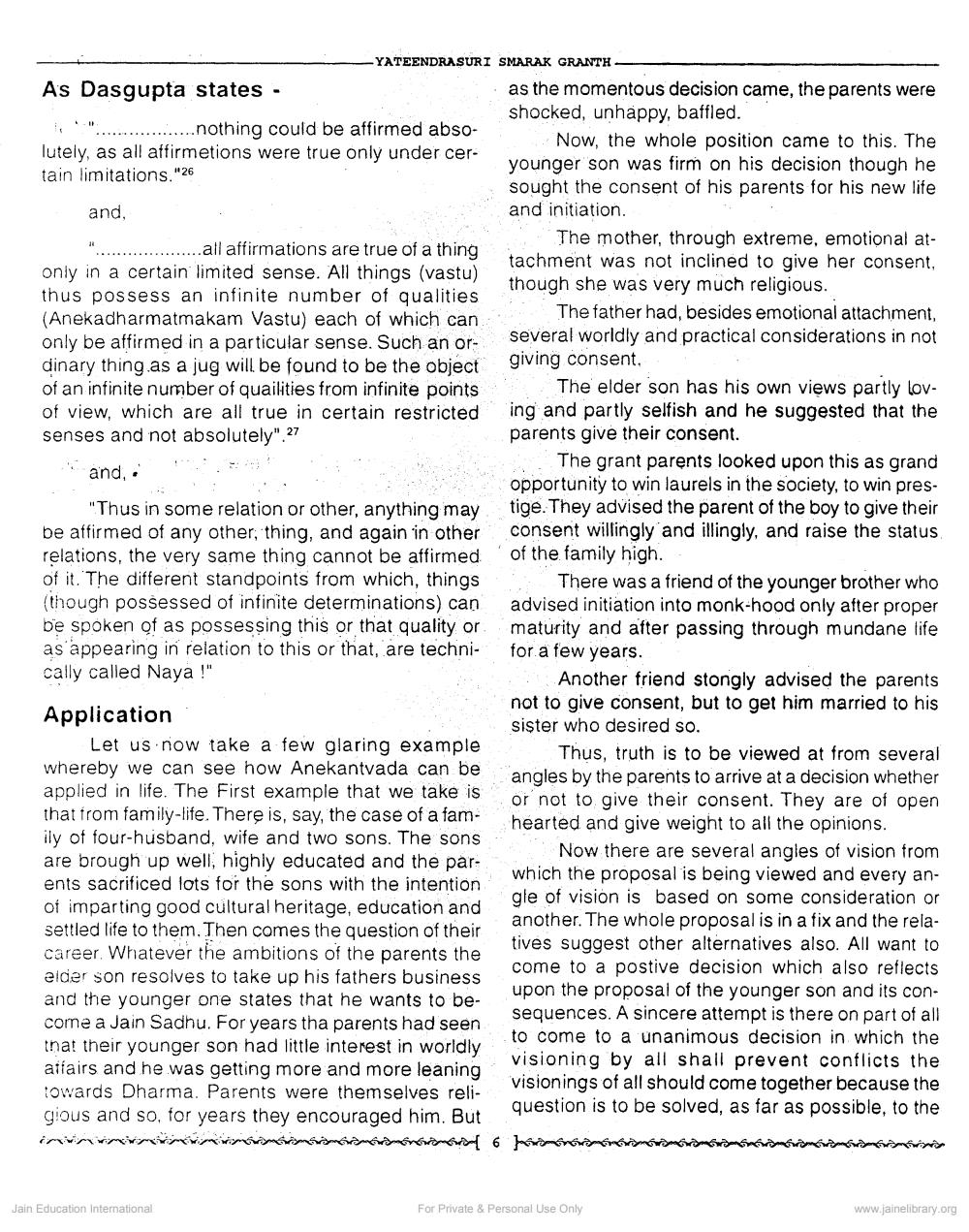Book Title: Application of Anekantavada Author(s): Ramesh S Betai Publisher: Z_Yatindrasuri_Diksha_Shatabdi_Smarak_Granth_012036.pdf View full book textPage 6
________________ As Dasgupta states - ...............nothing could be affirmed absolutely, as all affirmetions were true only under certain limitations."26 and, -YATEENDRASURI SMARAK GRANTH 20 all affirmations are true of a thing only in a certain limited sense. All things (vastu) thus possess an infinite number of qualities (Anekadharmatmakam Vastu) each of which can only be affirmed in a particular sense. Such an ordinary thing as a jug will be found to be the object of an infinite number of quailities from infinite points of view, which are all true in certain restricted senses and not absolutely".27 and,. "Thus in some relation or other, anything may be affirmed of any other, thing, and again in other relations, the very same thing cannot be affirmed of it. The different standpoints from which, things (though possessed of infinite determinations) can be spoken of as possessing this or that quality or as appearing in relation to this or that, are technically called Naya !" Jain Education International as the momentous decision came, the parents were shocked, unhappy, baffled. Now, the whole position came to this. The younger son was firm on his decision though he sought the consent of his parents for his new life and initiation. The mother, through extreme, emotional attachment was not inclined to give her consent, though she was very much religious. The father had, besides emotional attachment, several worldly and practical considerations in not giving consent. The elder son has his own views partly loving and partly selfish and he suggested that the parents give their consent. The grant parents looked upon this as grand opportunity to win laurels in the society, to win prestige. They advised the parent of the boy to give their consent willingly and illingly, and raise the status. of the family high. There was a friend of the younger brother who advised initiation into monk-hood only after proper maturity and after passing through mundane life for a few years. Another friend stongly advised the parents not to give consent, but to get him married to his sister who desired so. Application Let us now take a few glaring example whereby we can see how Anekantvada can be applied in life. The First example that we take is that from family-life. There is, say, the case of a family of four-husband, wife and two sons. The sons are brough up well, highly educated and the parents sacrificed lots for the sons with the intention of imparting good cultural heritage, education and settled life to them. Then comes the question of their career. Whatever the ambitions of the parents the elder son resolves to take up his fathers business and the younger one states that he wants to become a Jain Sadhu. For years tha parents had seen that their younger son had little interest in worldly affairs and he was getting more and more leaning towards Dharma. Parents were themselves religious and so, for years they encouraged him. But mine d[ 6 ] Thus, truth is to be viewed at from several angles by the parents to arrive at a decision whether or not to give their consent. They are of open hearted and give weight to all the opinions. Now there are several angles of vision from which the proposal is being viewed and every angle of vision is based on some consideration or another. The whole proposal is in a fix and the relatives suggest other alternatives also. All want to come to a postive decision which also reflects upon the proposal of the younger son and its consequences. A sincere attempt is there on part of all to come to a unanimous decision in which the visioning by all shall prevent conflicts the visionings of all should come together because the question is to be solved, as far as possible, to the For Private & Personal Use Only www.jainelibrary.orgPage Navigation
1 ... 4 5 6 7 8 9 10 11 12 13
